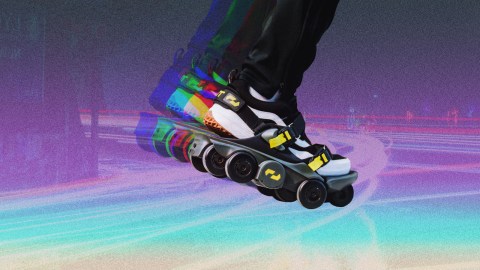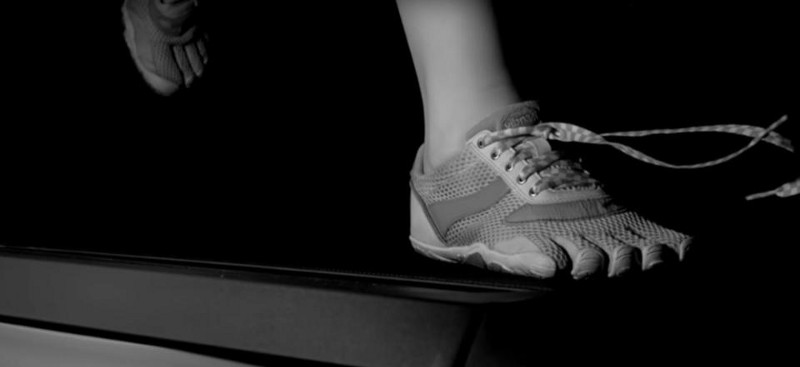World’s fastest “shoes” increase walking speed by 250%

- The shoes contain sensors that collect data on your gait.
- Machine learning algorithms then use that data to control the speed at which eight motorized wheels on the bottom of each shoe rotate.
- The shoes enable you to walk a mile in about 8.6 minutes.
Pittsburgh-based startup Shift Robotics has invented “shoes” that let you walk 250% faster without expending any extra energy — and you can own a pair of the speed-boosting kicks for $1,400.
Slow walk: Traveling via a bike, skateboard, or scooter is typically better for the environment than taking a car, and if you live in a place where traffic congestion can turn a 5-minute drive into a 20-minute trek, it can even be faster.
Those devices all require some degree of skill to use, though, so rather than risk crashing, the more clumsy among us often stick with the so-easy-a-toddler-can-do-it alternative: walking — but that can be painfully slow.
“Just walk faster to accelerate and walk slower to decelerate.”
Moonwalkers: Mechanical engineer Xunjie Zhang used to commute to work via scooter, but after almost getting into a crash, he made it his mission to figure out how to allow people to walk faster without exerting more energy or incurring additional safety risks.
After graduating from Carnegie Mellon’s Robotics Institute, he founded Shift Robotics along with a team of engineers, roboticists, and sneaker designers, and together, they developed “Moonwalkers,” a kind of cross between shoes and motorized roller skates that can boost a wearer’s walking speed by 250%.
How they work: Moonwalkers are designed to strap onto the bottom of whatever shoes you’re already wearing. To activate them, you lift one of your heels and give it a little twist in before setting it back down. To deactivate them, just lift the same heel and set it right back down.
When activated, sensors in the shoes collect data on your gait. Machine learning algorithms then use that data to control the speed at which eight motorized wheels on the bottom of each shoe rotate.
“There’s no need to balance,” said Zhang. “Just walk faster to accelerate and walk slower to decelerate.”
The average walking speed for people is about 2 to 4 miles per hour — at 3 miles per hour, say, it’ll take you 20 minutes to cover a mile. But Moonwalkers can increase that to 7 miles per hour, or just 8.6 minutes to walk a mile.
That’s a solid running pace, but you won’t work up a sweat. The experience is described as similar to walking on a moving sidewalk at an airport — you aren’t expending any extra effort, yet you’re traveling faster.
The wheels are never freerolling, so no need to worry about flying down a hill, and to stop, you just stop walking — even from the top speed, you’ll come to a halt within three feet, which is about the same distance it would take if you tried to stop while jogging.
The company says the shoes are also capable of handling rough urban terrain, including heavily cracked sidewalks.
“We engineered our 8-wheel patented drivetrain, consisting of overlapping wheels to simulate much larger diameter wheels to climb over uneven terrain and gravel,” writes Shift. “Brick and cobblestones streets are also easily traversable.”
The details: Moonwalkers have a range of about 6 miles and take 1.5 hours to fully charge via USB-C. Each “shoe” weighs 4.2 pounds, so you’ll get a bit of extra exercise if you need to wear them while walking up stairs (but make sure to deactivate them first to lock the wheels).
Moonwalkers best fit people with shoe sizes between men’s 9 to 12 and women’s 10.5 to 13.5, but Shift says it beta tested the devices with people who wore shoes as small as women’s size 7 and as large as men’s size 14, and they had no problems walking in them.
Moonwalkers do have a recommended user weight limit of 220 pounds, but Shift says heavier people can use them — they just might experience a slower top speed and shorter range.
Shift is selling Moonwalkers for $1,399 to customers in the US with plans to begin deliveries in the summer of 2023. You can reserve a pair with a $50 refundable deposit, with the remaining balance expected once the company locks down a delivery date.





